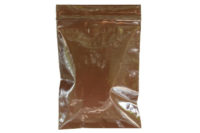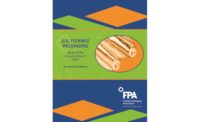The Flexible Packaging Association
conducted a two-phase series of pilot studies to show that synthetic crude oil, condensed wax, fuel pellets and combustible gases
are the valuable end-products successfully produced from pre-
and post?consumer flexible packaging waste.
Synthetic crude oil, condensed wax, fuel pellets and combustible gases are the valuable end-products that were successfully produced from pre- and post?consumer flexible packaging waste, according to a series of pilot studies conducted by the Flexible Packaging Association (FPA), Linthicum, Md. FPA conducted these studies on behalf of its members to evaluate end?of?life options for difficult?to?recycle flexible packaging waste.
FPA launched the Flexible Packaging Waste Resource Recovery Program in 2010 to identify companies and technologies that could utilize flexible packaging as feedstock to produce fuel, energy or other value-added end?products. The most promising technologies, identified in a study conducted for FPA by Columbia University’s Earth Engineering Center, were incorporated into the two?phase pilot studies.
New and emerging resource recovery technologies were utilized to convert flexible packaging scrap and waste into materials that can be used as energy.
During each phase of testing, pre- and post?consumer flexible packaging materials were successfully converted into diesel fuel, industrial wax and other materials that can be utilized as energy.
The full results of the “Flexible Packaging Resource Recovery Alternatives to Landfill: Pilot Program” report can be found at www.flexpack.org.
Get our new eMagazine delivered to your inbox every month.
Stay in the know on the latest snack and bakery industry trends.
SUBSCRIBE TODAY!Copyright ©2024. All Rights Reserved BNP Media.
Design, CMS, Hosting & Web Development :: ePublishing



